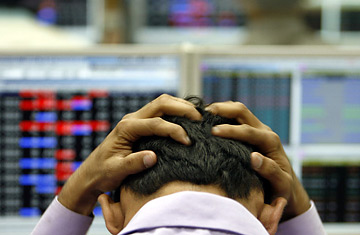
An Indian broker reacts in Mumbai as shares fall to their lowest level since 9/11.
It's not unusual for prices to tumble in the post-Christmas January sales. But this year, there's more unwanted stock than ever. Shares across Europe traded down Tuesday, a day after registering their biggest single-day slide since September 11, 2001. London's FTSE 100 index fell 5.5% Monday, swiping $150 billion off the value of Britain's blue-chip firms. The sell-offs were brisk in Asia, too. Shares in China skidded more than 7% to a 5-month low Tuesday; markets even suspended trading in India and South Korea on the back of heavy losses.
In London, you could almost smell the panic. "There's an acrid stench of fear," says David Buik at London brokers BGC Partners. The list of those investors' worries is growing. Despite a $150 billion package of tax cuts and other economic stimulus unveiled by President Bush last Friday, a recession in the U.S. remains "more likely than not," says Gabriel Stein, chief international economist at Lombard Street Research in London. The reason: markets can still only guess the scale of losses incurred by banks caught up in the collapse of the U.S. subprime mortgage market. With those banks themselves still somewhat in the dark — even after writing down tens of billions of dollars linked to those soured mortgage loans — it's gotten harder for institutions and individuals to borrow money. Even the Federal Reserve seems spooked: the U.S. central bank early Tuesday slashed a key interest rate by 0.75% to 3.5%, the biggest cut in more than 20 years.
Amid such a "serious credit crisis," says Buik, stock markets will only remain immune to genuine credit market volatility for so long. But the plunging share prices offered another kind of correction: that growth in Asia isn't enough to protect its markets against the effects of a U.S. recession. So while shares in China soared last year, "the idea [it] can decouple and not be affected by what happened in their most important export market [the U.S.] was always rubbish," says Stein, so long as domestic consumption can't make up for any shortfall. And neither is Asia resistant to fallout from the subprime snafu either. Analysts speculated Monday that Chinese banks could soon cough up to huge losses linked to exposure to the U.S. mortgage market. The Bank of China, for one, with almost $8 billion in subprime-related assets, is expected to shortly announce losses of its own.
As bad as things get in China, it'll be worse in the U.S. By mid-morning Tuesday, the Dow was already trading down 2.6%. Expect 2008 "to be a very bad year for the U.S.," says Stein.
